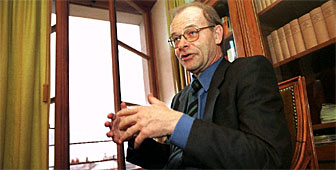Geneva bids farewell to a tenacious crime fighter

Bernard Bertossa, who stepped down as Geneva's chief prosecutor last week, broke the mould in the fight against corruption.
Few could have predicted the impact Bertossa would have when he first entered his third floor office in the Palais de Justice, in Geneva’s old town, 12 years ago.
In his two terms of office, this studious, chain-smoking 60-year-old has done more than anyone to change the perception of Switzerland as a haven for dirty money. In so doing, he has become a respected figure on the international stage.
Geneva is one of the world’s most important centres for private banking and asset management. This, combined with Switzerland’s banking secrecy laws, has attracted a great deal of money to the city, not all of it earned legitimately.
Breaking the mould
Prosecutors in Switzerland have traditionally had a laissez-faire attitude to the problem of money laundering. But Bertossa, along with the then Federal Prosecutor, Carla Del Ponte, helped to break the mould.
“Instead of simply playing to the rules, Bertossa quickly developed a very proactive way of dealing with these scandals,” says Mark Pieth, professor of criminal law at Basel University.
“He had a vision of what should happen – and that is that, in a globalised world, prosecutors need to cooperate more intensively,” he told swissinfo.
Bertossa was the driving force behind the Geneva Appeal, a declaration signed in 1996 by seven judges and prosecutors, aimed at alerting European politicians to the fact that archaic judicial systems had left them powerless in the face of international white-collar crime.
Now there are around 200 members of this informal grouping – from Switzerland, France, Italy, Belgium and Spain. They are seeking to create a “Europe of the Judges” which will encouraged cross-border cooperation to tackle cross-border crime.
Frozen assets
These contacts have proved fruitful in a number of recent international corruption investigations, such as that into the Elf-Aquitaine affair that rocked France last year.
In this, as in every other scandal in which illicit funds have reportedly passed through Geneva, Bertossa has immediately launched an investigation and frozen assets – no matter how powerful the suspect.
Not all ended in success. In Bertossa’s most high-profile failure, a suspected Russian mafia boss, Sergey Mikhailov, was acquitted after spending two years on remand. He won record damages of SFr800,000. But Bertossa’s readiness to launch criminal proceedings sends a message to would-be money launderers that they will not be safe, Mark Pieth believes.
“The role of a prosecutor is not just to act in those cases where you are sure of a conviction. You have to accept that sometimes people are freed,” he adds.
The list of those investigated by Bertossa, or in which he has lent legal assistance, makes impressive reading: Indonesia’s Suharto, the Philippines’ Marcos, Zaire’s Mobutu, Nigeria’s Abacha, Argentina’s Menem, Peru’s Montesinos, Mexico’s Salinas, Pakistan’s Bhutto and Russia’s Borodin.
Anti-Bertossa lobby
Bertossa’s investigations into rich and powerful clients has not always endeared him to Geneva’s bankers, even if many have now come to realise that shady dealings are not necessarily good for business. Even so animosity remains.
“The local banks have lobbied against Bertossa, but that’s a mistake. People like him are their best chance of changing their reputation,” Pieth says.
In parallel to Bertossa’s efforts in Geneva, the Swiss federal authorities have also acted to improve Switzerland’s image abroad, notably through the introduction of legislation that compels financial institutions to report suspicious deposits. But the message – that Switzerland is not a money-launderers’ paradise – is taking a while to filter through.
“Advertisements in New York newspapers don’t make much of a difference. But someone who stands up and challenges Russians depositing money in Geneva – even if he is not successful in every case – has a more marked impact on people’s perception,” says Pieth, chairman of an OECD working group on bribery.
Bertossa’s crusade against international money launderers has earned him criticism not only from bankers but also many local lawyers, who believe he has not devoted enough attention to more mundane crime.
With the prosecutor’s job comes a considerable amount of discretion regarding policy priorities and which cases to pursue.
Everyday crime neglected
“Obviously when you choose to enhance one aspect of the judiciary’s work, other areas suffer,” says leading Geneva lawyer, Michel Halpérin.
“Many believe Bertossa was not close enough to the everyday problems of the people of Geneva, that he was more interested in money-launderers than burglars,” he told swissinfo.
Prosecutors and lawyers in Geneva are often closely associated with a political party. Bertossa, a social democrat, was frequently accused of pursuing international money launderers for political reasons.
“My main criticism is that there was too much ideology in his strategic choices,” Halpérin says. “A judge or a prosecutor must implement the law, and must not be too imaginative. He must be a white knight fighting against all the evils of the world.”
Halpérin says that although Bertossa’s stand against corruption is laudable from an ethical point of view, it is unrealistic for a Swiss cantonal prosecutor to teach other countries how to behave.
The question now is what – apart from taking a well-earned rest – Bernard Bertossa wants to do with his life. Mark Pieth hopes he puts his energy and knowledge to good use: “He would be a tremendous asset if he were to continue to develop his concept of a Europe of the Judges, be it in an NGO or even an inter-governmental organisation.”
by Roy Probert

In compliance with the JTI standards
More: SWI swissinfo.ch certified by the Journalism Trust Initiative
You can find an overview of ongoing debates with our journalists here . Please join us!
If you want to start a conversation about a topic raised in this article or want to report factual errors, email us at english@swissinfo.ch.